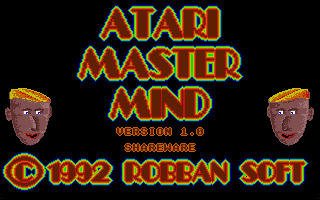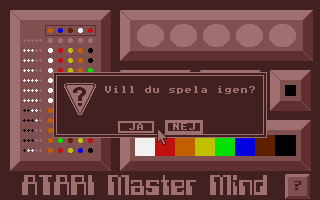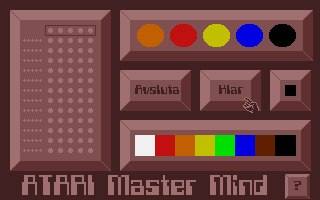Retro Replay Review
Gameplay
Atari Master Mind distills the essence of the classic code-breaking board game into a compelling solo digital experience. The computer conceals a secret sequence of five colored pegs, and your task is to deduce that sequence within a limited number of guesses. Each attempt is met with immediate feedback in the form of small black and white dots: black dots for perfectly placed colors, white dots for correct colors in incorrect positions. This simple mechanic encourages logical deduction and pattern recognition, making each playthrough a fresh mental challenge.
(HEY YOU!! We hope you enjoy! We try not to run ads. So basically, this is a very expensive hobby running this site. Please consider joining us for updates, forums, and more. Network w/ us to make some cash or friends while retro gaming, and you can win some free retro games for posting. Okay, carry on 👍)
The interface is clean and intuitive, allowing you to select colors with either joystick or keyboard commands. As you cycle through your pegs, the machine’s sniff-test evaluation is nearly instantaneous, keeping the pace brisk. Unlike some implementations where waiting for feedback can break immersion, Atari Master Mind keeps you in the zone, fostering a focused, almost meditative approach to puzzle solving.
One of the standout features is the adjustable difficulty. You can choose between a larger color palette or fewer feedback pegs to ramp up the challenge. For new players, a smaller selection of hues and more generous feedback makes for a forgiving introduction. Seasoned codebreakers can crank the difficulty to eleven, turning the game into a true brain-bender that rewards patience and strategic planning.
Multiplayer isn’t built in, but the head-to-head potential is real: take turns challenging friends to break the same code in fewer moves. This communal twist turns what is fundamentally a one-player puzzle into a social duel of wits. Whether you’re aiming for a personal best or outsmarting your pals, Atari Master Mind delivers a timeless logic workout.
Graphics
Graphics in Atari Master Mind are minimalist by modern standards, yet they effectively serve the game’s core puzzle mechanics. The screen presents a straightforward grid of slots for your peg guesses and a sidebar for feedback markers. The pegs themselves are rendered as crisp, solid blocks of color—no frills, just clarity. This simplicity ensures that your attention stays firmly on decoding the secret sequence.
Color differentiation is critical, and Atari’s palette of bright, distinct hues helps prevent confusion. Reds, blues, greens, yellows and more all pop against the stark black background. Even on older CRT displays, the contrast remains sharp, ensuring you don’t misread a peg under dim room lighting. For players concerned about color vision deficiencies, the game’s selectable patterns can be toggled, letting you assign shapes or shades for added accessibility.
While there are no animated flourishes or detailed sprites to admire, small sound cues accompany each guess and feedback reveal. The satisfying beep when a black dot appears feels like a little victory, while the quieter click of a white dot keeps you coming back for more. These audio touches make every correct inference—and every near miss—resonate with satisfying weight.
The static layout may seem bare, but it’s a deliberate design choice that emulates the classic board game’s tactile feel. There’s no distraction from the puzzle at hand, no extraneous menu screens or flashy transitions. You sit down, you guess, you observe the results and you adjust. It’s a purist’s presentation, honoring the game’s intellectual heritage.
Story
Strictly speaking, Atari Master Mind lacks a narrative in the traditional sense—there are no characters to meet, no plot twists to follow. Yet behind every secret code lies an implicit storyline: you versus the unseen programmer, locked in a silent duel of intellects. The game’s “story” unfolds in the mental theatre of your own strategy sessions, as you map hypotheses, discard false leads and edge closer to unseen truths.
Every confrontation with the computer feels like entering a labyrinth of colored corridors. With each guess, you uncover a bit more of the labyrinth’s architecture. The stakes—though humble compared to grand RPG quests—carry a personal weight: the pride of cracking the code in fewer turns than last time, the little thrill of uncovering a perfectly placed peg. This psychological narrative keeps you invested, even in the absence of cutscenes or dialogue.
In a broader sense, Atari Master Mind taps into the archetype of the solitary detective, sifting through clues to solve a mystery. You play the role of investigator, interrogator and jury all at once—formulating theories, testing them, then passing judgment based on the clues. This mental role-play fosters a sense of intellectual agency often missing in more linear, story-driven titles.
Despite its lack of a formal storyline, the game’s situational context—challenging an algorithm to outwit it—carries its own narrative momentum. As your attempts dwindle, tension builds. The prospect of failure fuels your ingenuity. And when you finally crack the code, there’s a concise but potent payoff: the screen fills with black dots, signaling total victory. In that moment, you’ve lived a short but sweet story of conquest.
Overall Experience
Atari Master Mind may not dazzle with high-octane action or cinematic cutscenes, but its enduring appeal lies in pure cognitive challenge. It’s the perfect title for players who relish logical puzzles and methodical deduction. Whether you have ten minutes between tasks or an hour to spare, the game scales to your time frame, offering quick sessions or deeper bouts of strategy refinement.
The game’s minimal resource demands mean it runs smoothly on classic hardware, evoking a sense of nostalgia for those who grew up with Atari’s early palette of intellectual amusements. For newcomers, it serves as a masterclass in how game design can distill an abstract concept—code-breaking—into an accessible and compelling digital form.
Given its solo nature, Atari Master Mind excels as a personal mental workout. It’s ideal for players seeking a low-pressure environment to sharpen reasoning skills, retrain their pattern-recognition faculties, or simply wind down with a quiet but satisfying challenge. Its simplicity is its strength: no tutorials to slog through, no microtransactions to navigate, just you, the colors, and the dots.
Ultimately, Atari Master Mind stands as a timeless translation of a beloved board game, rendered with crisp visuals, clear feedback and endless replay value. If you appreciate cerebral gameplay and are intrigued by the idea of challenging your intellect against a cold, calculating adversary, this is one Atari title that won’t leave your mind wanting.
 Retro Replay Retro Replay gaming reviews, news, emulation, geek stuff and more!
Retro Replay Retro Replay gaming reviews, news, emulation, geek stuff and more!






Reviews
There are no reviews yet.